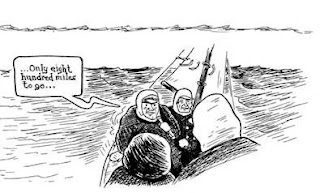 |
Stromness Whaling Station: first sign of civilization in
17 months for Shackleton and two other men |
After two days of rest, Shackleton decided him and two other men would attempt to cross the rugged land and find help. It was deemed impossible, but they had no other choice since their boat's rudder had been torn off when it hit they rocks. They set out and encountered many problems, having to retrace their steps multiple times. When Shackleton heard a steam whistle, he thought it was too good to be true, but looking down from a mountain peak he saw a whaling station. For the first time in seventeen months, they saw civilization. Shackleton asked one of the men working to take him to who was in charge, who they said was Thoralf Sorlle. Shackleton said he knew Sorlle so they went to meet him. Everyone believed that the
Endurance had been lost in the Antarctic along with her entire crew so when Sorlle saw that it was Shackleton, he was overwhelmed.
 |
| Success is a journey; set a destination |
The men bathed and ate before planning a rescue for the other 22 men still on Elephant Island. For three months they attempted to break through the ice to no avail. Four months after the
Caird left, on August 30, after three tries with three different boats, Shackleton was finally able to reach Elephant Island. The men were giddy with excitement and nothing, not even food, could distract them from the joyous moment of seeing that ship on the horizon. All 28 men had survived for over 20 months in the harshest climate here on earth and, even though they didn't accomplish what they set out to do, they still felt like they won. I imagine they must have had a sort of
epiphany when they realized they had actually accomplished much more than what they set out to do because of the unfortunate situations they were in.
My favorite part of the entire novel was when Shackleton and his two companions had to slide down the side of a mountain because climbing would have taken too long. They did not know what was awaiting them at the bottom or if they would even survive such a risky plunge. By doing this, the three men most definitely gave the phrase "taking a leap of faith" a whole new meaning and I found it very inspiring.
"So he suggested they slide...They seemed to hang poised for a slit second, then suddenly the wind was shrieking in their ears and a white blure of snow tore passed...They screamed-not in terror necessarily, but simply because they couldn't help it...They were breathless and their hearts were beating wildly. But they found themselves laughing uncontrollably...and they felt that special kind of pride of a person who in a foolish moment accepts an impossible dare-then pulls it off to perfection."
This story gave me, as well as Shackleton and his men I'm sure, a new appreciation for nature and all of God's creation. It also gave me hope to see that, even in the worst situation, we are capable of surviving even the harshest climate on earth given the right amount of determination, courage, and a sense of adventure.








